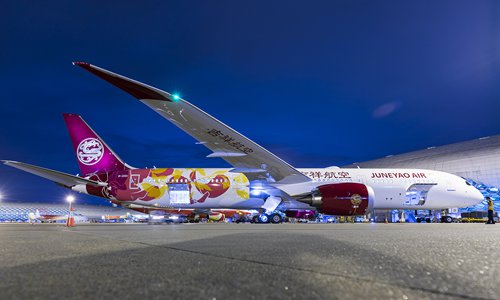HOME >> BUSINESS
From chartered flights to intercontinental routes
By Tu Lei Source:Global Times Published: 2019/10/10 21:07:01
Private Chinese airline expanding and becoming more competitive globally

A Juneyao Airlines Boeing 787-9 plane in Shenzhen airport's T3 on September 1. Photo: VCG
As one of the first carriers permitted to conduct civil aviation business in China, the private-owned Juneyao Airlines is expected to surprise the market with a series of activities in the coming days.
It is anticipated that the carrier will open a new route from Harbin in Northeast China's Heilongjiang Province to Japan's Osaka on October 27.
On the same day, the company will transfer its operations from Beijing Capital International Airport to China's new Beijing Daxing International Airport. It is expected to launch its flagship Boeing 787 wide-body aircraft to serve domestic, major business lines, such as the Beijing-Shanghai route, at the new airport.
Headquartered in Shanghai, China's highest-market-value aviation hub, Juneyao has developed steadily over the past 13 years. Beginning with only three small aircraft in 2006, it has now developed into a medium to large carrier with more than 70 wide-body and narrow-body aircraft including the A320 and the Boeing 787-9.
The airline's route network has expanded from one domestic route to more than 160 destinations in China and overseas, with more than 18 million annual passenger trips made in 2018.
"Juneyao's target markets are mainly high-value markets such as Beijing, Shanghai, Guangzhou and Shenzhen. Our company focuses on customer experience and value creation by serving the passengers with Juneyao's ecosystem," Wang Junjin, chairman of the company, said in a recent exclusive interview with the Global Times.
The carrier purchased its first flagship Boeing 787 aircraft in October 2018, and is expected to receive 10 Boeing 787s by the end of 2020.
Intercontinental routes
It is inevitable that domestic airlines will expand their long-haul, intercontinental routes, particularly for airlines located in Shanghai, which has abundant high-level international passengers.
Although there are 60 carriers operating in the Chinese market, most of the flight slots and resources are still owned by three aviation giants - Air China, China Eastern Airlines and China Southern Airlines - making the competition serious.
Juneyao Airlines made the decision to enter into intercontinental business. In 2017, it signed an order with Boeing for 10 Boeing 787-9s, making it possible to expand its network to long-haul destinations and fly further.
In June, the company made its first flight from Shanghai to Finland and became the first Chinese private airline to operate long-haul, wide-body aircrafts.
During the opening ceremony for the route, Wang said that the airline has benefited from the fact that many companies from Finland and Northern Europe have established their headquarters in Shanghai, and from the growing passenger traffic between the Nordic region and Asia.
Before the route opened, Juneyao Airlines signed a code-sharing agreement with Finnair, which already operates the Shanghai Pudong-Helsinki route. Juneyao has also established a transit network for major domestic routes in Finland.
Wang said that 10 Boeing 787-9s will be delivered by 2020, and the carrier's network will follow the map of the Belt and Road Initiative.
"We are buying more aircraft than we rent now. The performances of current target and debt ratios are acceptable," he explained.
Earlier, a notice was posted on the website of the Civil Aviation Administration of China (CAAC), reading that the carrier had applied for routes from Shanghai to Athens and Shanghai to Manchester. Previously, it had applied for the route from Shanghai and Nanjing to London, but failed to gain approval.
"The airline only has four Boeing 787 aircraft. This does not allow for a large number of international flights. In the future, our company will develop a new model containing intercontinental and domestic routes," he said. "Now we have the right to fly to Greece. Extended routes to Ireland and Iceland are included in the plan," he added.

Juneyao Airlines chairman Wang Junjin Photo: Courtesy of Juneyao Airlines
Business environmentWang's business is an excellent example of China's reform and opening-up achievements, with his airline having begun from Soviet An-24 propeller-driven aircraft in 1991.
After former Chinese leader Deng Xiaoping's speech to encourage China's reform and opening-up in 1992, Wang's charter-flight business saw rapid growth in Shanghai and Kunming, capital of Southwest China's Yunnan. Since then, increasing numbers of routes have been added to the business.
On September 25, 2006, an Airbus A320 passenger plane took off from the headquarters of JuneYao Group and landed smoothly in Changsha, Central China's Hunan Province the starting point of the Wang brothers' aviation dream.
With the deepening of reform and opening-up, the dream of the Wang family's airline has finally come true. At the end of 2014, they established a low-cost airline subsidiary, 9 Air Co, in Guangzhou, South China's Guangdong Province. In 2015, Juneyao Airlines was listed on the Shanghai Stock Exchange.
China had 60 aviation enterprises by the end of 2018, with a net increase of two airlines over the previous year. Among the 60 airlines, there were 45 state-owned companies and 15 private companies. Eight were listed companies and 10 were joint-venture airlines, according data from the CAAC.
As a Star Alliance Connecting Partner that has cross-shareholdings with China Eastern Airlines and code-sharing agreements with Finnair, Juneyao formed a cooperation model across the three major aviation alliances. It is also an experiment for the development of private airlines, which are in weak positions when it comes to aviation industry competition.
"China is becoming more open in terms of business environment, market transparency and resource allocation. Policies, market mechanisms and market entry conditions are changing. China will definitely become more and more open in the future," Wang said.
"Private enterprises do not need special policies. They need fair treatment. More opening-up, private enterprises are getting better," he added.
Posted in: BIZ FOCUS,AVIATION